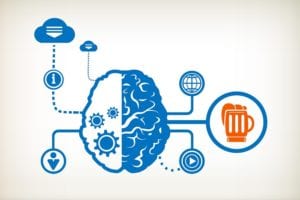Alcohol abuse is a problem that is easily overlooked due to the prevalence in adult society. According to the National Institute on Alcohol Abuse and Alcoholism1, 86.8 percent of adults will drink alcohol in their lifetime and 70.7 percent will drink alcohol at least once in a year.
In any given month, roughly 24.6 individuals over 18 years old will binge drink and roughly 6.8 percent will drink heavily, reports the National Institute on Alcohol Abuse and Alcoholism1. When you binge drink alcohol, it impacts your physical body and your brain.
Short-Term Effects of Alcohol Abuse
Drinking alcohol impacts the brain in different ways; however, certain short-term effects occur when you drink excessively over a short period of time. The National Institute on Alcohol Abuse and Alcoholism2 says that alcohol interferes with the way that your brain communicates. As a result, you or a loved one will notice certain behaviors or actions that indicate intoxication.
The short-term impact of alcohol abuse includes:
- Slurred speech
- Decreased coordination
- Blackouts
- Memory loss
- Unconsciousness
Since alcohol interferes with normal communication throughout the body, it disrupts the way that you behave. The Foundation for a Drug-Free World3 explains that your physical condition and the amount that you drink will determine the specific impact on your body.
Long-Term Effects of Alcohol Abuse
Excessive alcohol abuse over a long period of time has a greater impact on your brain and body when compared to a single night of intoxication. Excessive alcohol abuse increases the risk of alcohol addiction.
When an addiction occurs, the brain changes so that your body craves the substance and you might not feel normal when you do not drink. Severe alcohol withdrawal symptoms, such as hallucinations or delusions, develop in some situations.
Nutrient Deficiencies
Since alcohol also leeches certain nutrients, it can cause nutrient deficiencies. According to the National Institute on Alcohol Abuse and Alcoholism4, thiamine deficiency causes severe brain disorders.
Long-term alcohol abuse results in low levels of thiamine and chronic alcohol addiction impacts the brain indirectly by causing malnutrition.
A severe thiamine deficiency causes Wernicke–Korsakoff syndrome. Severe cases of Wernicke–Korsakoff syndrome result in paralysis, psychosis, mental confusion or other difficulties with muscle coordination.
Alcohol-related brain atrophy, or a brain that is shrinking in size, also occurs in some situations. The National Institute on Alcohol Abuse and Alcoholism5 reports that long-term alcohol addiction increases the susceptibility of an individual to alcohol toxicity. As a result, toxic waste builds up on the brain and changes the appearance and function of the brain. In some cases, the damage to the brain is permanent.
Treating an Addiction
Alcohol addiction damages the way that your brain works. It reduces your cognitive function and increases the risk of developing severe brain damage. Seeking treatment as early as possible helps reduce the risk of permanent brain damage and provides a chance to start working toward your recovery goals.
During treatment, you will learn different ways to avoid alcohol when cravings occur and you will focus on improving your health and general well-being so that you are prepared for the future.
Severe consequences occur when you abuse alcohol for an extended period of time. It harms your brain, body and your relationships with loved ones. Early treatment provides the chance to start obtaining your recovery goals and avoiding alcohol before it causes irreparable damage to your body and brain. Allow your body to heal by removing alcohol abusive cycles from your lifestyle.
References:
- Alcohol Facts and Statistics, The National Institute on Alcohol Abuse and Alcoholism, March 2015, http://www.niaaa.nih.gov/alcohol-health/overview-alcohol-consumption/alcohol-facts-and-statistics
- Alcohol’s Effect on the Body, The National Institute on Alcohol Abuse and Alcoholism, http://www.niaaa.nih.gov/alcohol-health/alcohols-effects-body
- The Truth About Alcohol, The Foundation for a Drug-Free World, http://www.drugfreeworld.org/drugfacts/alcohol/short-term-long-term-effects.html
- Alcohol’s Damaging Effects on the Brain, The National Institute on Alcohol Abuse and Alcoholism, October 2004, http://pubs.niaaa.nih.gov/publications/aa63/aa63.htm
- Marlene Oscar-Berman, Ph.D. and Ksenija Marinkovic, Ph.D., Alcoholism and the Brain: An Overview, The National Institute on Alcohol Abuse and Alcoholism, July 2004, http://pubs.niaaa.nih.gov/publications/arh27-2/125-133.htm












